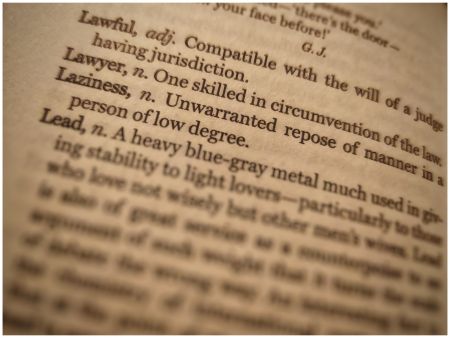Algorithm: Difference between revisions
Amwelladmin (talk | contribs) No edit summary |
Amwelladmin (talk | contribs) No edit summary |
||
| Line 1: | Line 1: | ||
{{ | {{def|Algorithm|/ˈalɡərɪð(ə)m/|n|}}A recipe, process or set of rules to be followed to achieve a pre-determined outcome, especially by a computer, a replicated organism or [[school-leaver in Bucharest]]. An [[algorithm]]’s success depends on all problems within its field of operation having been finally solved, so it can operate without obstruction or intervention from a guiding intelligent hand. Described by {{author|Daniel Dennett}} as a “universal acid”, the concept of the algorithm has certainly burned through ifs fair share of synapses in the [[management consultant|management consulting]] industry. The notion that the ''something'' of rice pudding and income tax might come from the ''nothing'' of primordial sludge, without a beneficent creator, is the basis behind the current dogmas of [[artificial intelligence]], and the belief that ''no'' intelligence, let alone [[subject matter expert]]ise, is needed to manage a [[complex]] process such as running an [[investment bank]]. | ||
Compare with a [[heuristic]]. | Compare with a [[heuristic]]. | ||
| Line 8: | Line 8: | ||
Also of great interest to [[evolution]]ary biologists, psychiatrists and philosophers: According to {{author|Daniel Dennett}}, the great (if unstated) insight of {{author|Charles Darwin}}’s {{br|The Origin of Species}} was that the evolutionary process was a mindless, algorithmic one, that could operate without intervention. This made him a household name ([[Daniel Dennett|Dennett]], not Darwin) when he published {{br|Darwin’s Dangerous Idea}}. | Also of great interest to [[evolution]]ary biologists, psychiatrists and philosophers: According to {{author|Daniel Dennett}}, the great (if unstated) insight of {{author|Charles Darwin}}’s {{br|The Origin of Species}} was that the evolutionary process was a mindless, algorithmic one, that could operate without intervention. This made him a household name ([[Daniel Dennett|Dennett]], not Darwin) when he published {{br|Darwin’s Dangerous Idea}}. | ||
{{sa}} | {{sa}} | ||
| Line 19: | Line 16: | ||
*[[Substance and form]] | *[[Substance and form]] | ||
*[[Algorithm vs. heuristic]] - machine versus human | *[[Algorithm vs. heuristic]] - machine versus human | ||
Revision as of 19:16, 14 December 2020
|
|
Algorithm /ˈalɡərɪð(ə)m/ (n.)
A recipe, process or set of rules to be followed to achieve a pre-determined outcome, especially by a computer, a replicated organism or school-leaver in Bucharest. An algorithm’s success depends on all problems within its field of operation having been finally solved, so it can operate without obstruction or intervention from a guiding intelligent hand. Described by Daniel Dennett as a “universal acid”, the concept of the algorithm has certainly burned through ifs fair share of synapses in the management consulting industry. The notion that the something of rice pudding and income tax might come from the nothing of primordial sludge, without a beneficent creator, is the basis behind the current dogmas of artificial intelligence, and the belief that no intelligence, let alone subject matter expertise, is needed to manage a complex process such as running an investment bank.
Compare with a heuristic.
Of particular interest in financial services:
- High-frequency trading computers follow algorithms faster and more reliably than a mortal trader could dream of;
- The dogma of outsourcing is predicated on a playbook; a form of algorithm for the meatware.
Also of great interest to evolutionary biologists, psychiatrists and philosophers: According to Daniel Dennett, the great (if unstated) insight of Charles Darwin’s The Origin of Species was that the evolutionary process was a mindless, algorithmic one, that could operate without intervention. This made him a household name (Dennett, not Darwin) when he published Darwin’s Dangerous Idea.
